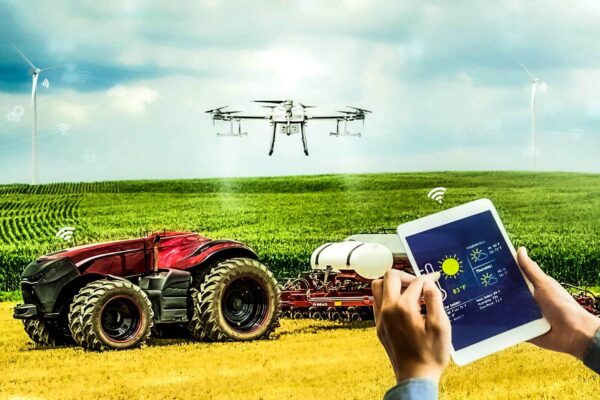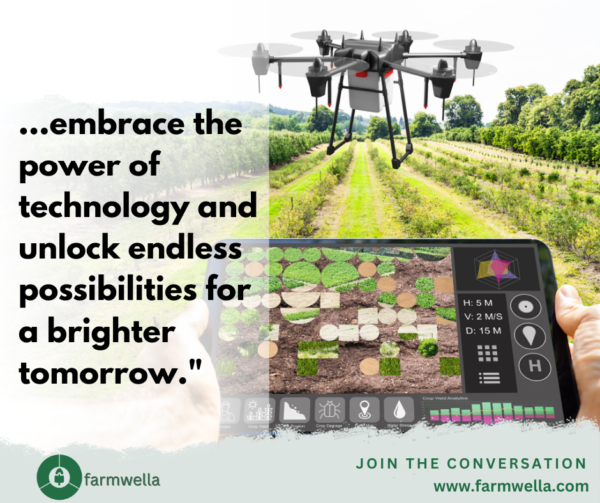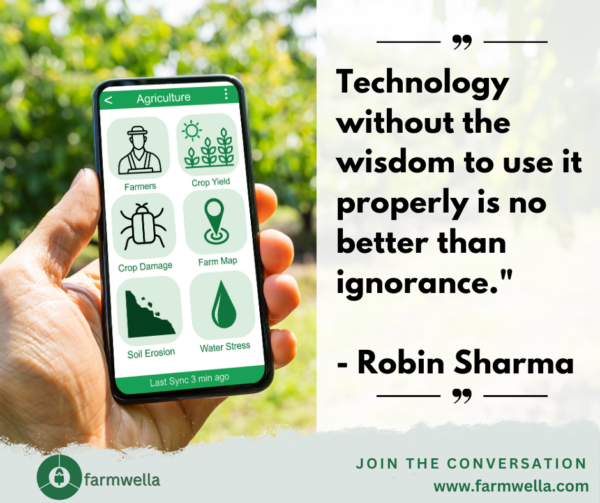Bill Gates once said, “Technology is a tool that can be used for good or bad, but it’s up to us to decide how we want to use it.” This means that technology can be helpful or harmful, depending on how we use it, which is absolutely true!
Technology has been around for a while, and it has made our lives easier in many sectors, such as communication, transportation, and even agriculture.
Agriculture, despite being a significant economic sector in Africa, still faces many challenges that need to be resolved.

One of the most pressing issues is food shortage, which continues to plague many African countries. One of the reasons for this is that many farmers in Africa have yet to fully embrace technology.
You may be curious about why farmers should integrate technology into their daily agricultural practices, especially since agriculture has been around for centuries without it. Let’s explore some compelling reasons why harnessing technology can significantly benefit agriculture.
Why African Farmers Should Integrate Technology into Their Daily Agricultural Practices

Easy Access to Information
“Information is key” and it is incredibly important in modern agriculture. Thanks to technological advancements, farmers can now use data-driven agriculture to make informed decisions based on up-to-date information.
Technology has also made it easier for farmers to connect with other farmers from around the world, allowing for the exchange of valuable information and knowledge-sharing.
With access to data on things like weather patterns, soil quality, crop growth stages, and market trends, farmers can make informed decisions and optimize their crop management practices to increase productivity and efficiency.
Improved Access to Mechanized Farming
The development of technology has substantially increased the accessibility of mechanized farming in many ways.
One of the most notable ways is through the creation of cost-effective and highly efficient farm machinery such as tractors, plows, and harvesters. These machines can assist farmers in increasing their productivity, lessening the physical exertion of manual labor, and also reducing costs.
Also, technological improvements in sensors, drones, and GPS technology can enable farmers to monitor and manage their crops with greater accuracy and efficiency.
Easy Access to the Market
Technology has made it easier for farmers to access the market by providing them with information about market trends, pricing, and consumer demand through the internet and mobile applications.
Also, E-commerce platforms allow farmers to sell their products directly to consumers, without any middlemen. Technology can also enable traceability and transparency in the supply chain, which is important for consumers.
Ways to Utilize Technology for Smart Farming in Africa
Smart farming involves using technology to improve farming practices, increase crop production, lower costs, and create more sustainable farming.
Smart farming can make a significant impact on food security and improve the lives of smallholder farmers in Africa. This article will take you through four various ways technology can be harnessed to implement smart farming practices in Africa. So, let’s dive right in!

1. Internet of Things (IoT)
IoT refers to a network of connected devices, sensors, and machines that are capable of exchanging data with each other and with the internet. In agriculture, IoT is utilized to create a smart farming system by making use of these devices and sensors. Here are ways IoTs can be used for smart farming:
- Automated Irrigation
With IoT, farmers can automate irrigation systems based on real-time weather data and soil moisture levels, which saves water and reduces labor costs.
- Soil Monitoring
IoT sensors can be placed on the farm to keep an eye on soil moisture, temperature, and humidity. This information can be sent to the farmer’s phone or a central server, so they can check the conditions and adjust their farming practices like irrigation and fertilization.
- Remote Control of Farm Machinery
Farm machineries like tractors, planters, and harvesters from a distance can be controlled from a distance with IoT. This helps farmers work more efficiently and safely by reducing the risk of accidents.
2. Use of Precision Agriculture
Precision agriculture is an advanced farming approach that utilizes technologies such as GPS, remote sensing, and data analytics to observe crop growth and soil conditions.
How can precision agriculture be used for smart farming in Africa?
Well, farmers in Africa can incorporate precision agriculture techniques into their farming practices in various ways. These include:
- Precision Planting
Farmers can use GPS and precision planting equipment to plant seeds at the perfect depth and distance from one another. This helps each plant receive the right amount of nutrients and reduces competition for resource
- Variable Rate Technology
Farmers can save resources and reduce the environmental impact of farming by using variable-rate technology to apply fertilizers, pesticides, and other inputs only where and when they are needed.
- Predictive Analytics
Farmers can use predictive analytics to forecast weather patterns, disease outbreaks, and other factors that can impact crop yield. This helps them take preventative actions to safeguard their crops and achieve maximum yields.
3. Smart Sensors
Smart sensors can revolutionize data collection in farming by collecting information about various farm conditions. Some of the ways smart sensors are beneficial for farmers include:
- Crop Monitoring
Smart sensors can help farmers grow better crops and use less water by monitoring soil moisture, temperature, and nutrient levels.
With this information, farmers can make better decisions about when and how much to water and fertilize their crops, which can increase crop yields and reduce water waste.
- Weather Monitoring
Smart sensors can track weather conditions like temperature, humidity, and wind speed, which farmers can use to schedule planting and harvesting activities effectively.
This information can help them predict and get ready for severe weather events.
- Pest and Diseases Monitoring
Smart sensors can detect pests and diseases in crops. They can help prevent crop losses by detecting them early. This reduces the need for harmful pesticides and chemicals.
4. Drones and Satellites
The use of drones and satellites can assist farmers in achieving sustainable and efficient agriculture by maximizing production while reducing environmental impact. The utilization of drones and satellites can be beneficial in:
- Crop Monitoring
Drones and satellites equipped with cameras or multispectral sensors can take detailed pictures of crops to track their health and growth. With this, farmers can detect problems such as stress or disease and take action quickly to fix them.
- Mapping and Surveying
Drones and satellites can produce detailed maps of farms that show the lay of the land, soil types, and other important features. This information can help farmers use their land more efficiently, design irrigation and drainage systems, and plan where to plant crops.
- Precision Agriculture
Drones and satellites play a vital role in precision agriculture practices that aid crop management. Drones, equipped with sensors, can detect crop health, moisture, and nutrient levels that help identify issues at an early stage.
On the other hand, satellites collect information about vegetation health that enables farmers to estimate crop yields and plan the harvest. With drones, farmers can adjust irrigation patterns and minimize waste by applying pesticides and fertilizers more precisely.
Additionally, farmers can plant seeds and apply fertilizers more efficiently to maximize yield.
In conclusion, some of Africa’s pressing issues can be addressed with these. It is also possible to guarantee a high degree of productivity. They can as well create job prospects because some farmers have devoted their time and made it their business to sell and teach other farmers how to use this technology.
These four methods are not confined to African farmers; farmers all around the world are already harnessing the power of technology to improve farm efficiency.